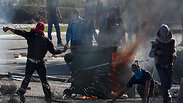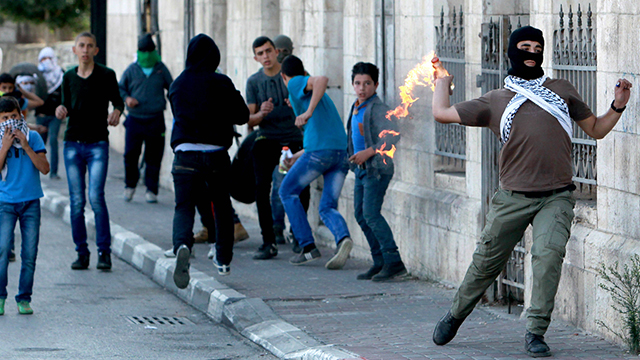
'An intifada is breaking out, and Israel is mainly calming itself down'
Photo: AP
Intifadas don’t start; they are discovered in retrospect. Historians can detect the signals, experts explain the circumstances which lead to waves of terror, but in real time "all clear" sirens sound. That's the way of Israeli governments, perhaps the nature of human beings.
In September 2000, when the Al-Aqsa Intifada
broke out, I was already a young reservist. They sent us to the Erez Crossing area to fill in. We didn't realize there was an intifada at the time either, and even the political echelon treated the situation as a small crisis which would be over in no time. Sometimes they talked, sometimes they fired and sometimes they issued contradicting orders to calm the situation down.

In December 1987, when the first intifada broke out, I was a young boy. Life around me changed, but I didn't know, and neither did most Israelis. The IDF ignored the situation, then-Defense Minister Yitzhak Rabin traveled to the United States for two weeks, and the settlers waited for it to pass.
Terror on the Street
Analysis: Palestinian and Israeli Arab incitement, loss of fear, feelings of deprivation and admiration for the Islamic State are the engines of violence leading us to a third intifada.
We are now at the start of a third intifada – a wave of violence based on the national conflict which has yet to be solved here so far. We have been there for several weeks now. Monday's attacks only make the violence less peripheral.
An intifada is a double-edged sword. It mainly hurts the Palestinians – destroys their lives, ruins their economy. Then it hurts us too.
Terror can be defeated despite thousands of claims and arguments why it cannot be. Israel did it in the Al-Aqsa Intifada. It can damage the terror infrastructures, kill or arrest most of the activists, and also create deterrence.
The debate about the defeat is futile if only due to the fact that when an intifada breaks out Israel has no other choice, but after the defeat comes the need for a victory which means cost/benefit considerations. The victory is in people's minds – that's why it's so significant.

Riots in Bethlehem. 'An intifada is a double-edged sword. It mainly hurts the Palestinians – destroys their lives, ruins their economy. Then it hurts us too' (Photo: AFP)
There are two clear conclusions from the past: One is that a war on terror makes Israelis move to the right and oppose speculative agreements with the Palestinians. The dreams are only convenient when it's quiet. The Al-Aqsa Intifada sent the left into a state of electoral bankruptcy. It failed to create alternative but simply recited the mantra of agreements.
The politicians on the right, on the other hand, take to intifadas like a duck to water. They pose for pictures at scenes of terror attacks, make scathing statements about destroying terror and urge the government to do something. When they are in the opposition, it works splendidly. In the past few years, they have managed to do it in the coalition as well.
Wait for the election campaign and you'll see that people will have forgotten the fact that it was the current government (which includes all right-wing parties) which released terrorists, left a strong Hamas in Gaza and contained the events in Jerusalem.
The second conclusion is that although an intifada is good for the right's electorate, it's bad for its ideology. After every round of violence, Israel loses territory and is dragged into an even more violent entanglement.
The first intifada led Israel to the Oslo Agreements. Yasser Arafat returned, and his men received weapons. The city of Gaza was handed over to the Palestinian Authority and 40% of the Judea and Samaria territories were placed under independent Palestinian control. The Greater Land of Israel became less great.
The Al-Aqsa Intifada drove former Prime Minister Ariel Sharon to the disengagement. Jews were evacuated from the Gaza Strip and northern Samaria. The public became more rightist but with fewer settlements.
This is the catch for those who don't want to see another settlement evacuation. The State of Israel has no more land it can abandon. A military defeat of a Palestinian wave of violence requires us to address the victory that will follow.
And this is where Mahmoud Abbas comes in – the problem and the solution. Abbas is a complicated figure. He is not a terrorist like Arafat, but a poor-quality collaborator. He hates Israel, fights it through diplomacy and incitement, but doesn’t send out the terror himself. He despises us, but cooperates. We can't trust him, we can't sign agreements with him (despite the heart's desire of Israeli politicians), but that's the way it is.
The first rule one learns from intelligence activists is that one has to find the right button to operate people: Money, fear, affection, respect, deterrence. Abbas is no longer being operated. Instead, people hang unnecessary hopes on him and get angry.
What is happening at the moment is that an intifada is breaking out, and Israel is mainly calming itself down.
















